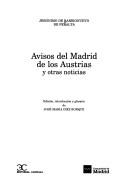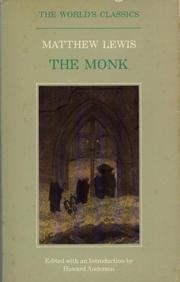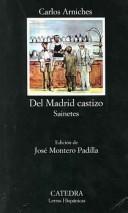| Listing 1 - 10 of 15 | << page >> |
Sort by
|

ISBN: 8470397362 Year: 1996 Publisher: Madrid Castalia
Abstract | Keywords | Export | Availability | Bookmark
 Loading...
Loading...Choose an application
- Reference Manager
- EndNote
- RefWorks (Direct export to RefWorks)
Madrid (Spain) --- Ma-te-li (Spain) --- Mageritah (Spain) --- Matricen (Spain) --- Mayrit (Spain) --- Villa de Madrid (Spain) --- Мадрид (Spain) --- مدريد (Spain) --- Madrit (Spain) --- Горад Мадрыд (Spain) --- Horad Madryd (Spain) --- Мадрыд (Spain) --- Madryd (Spain) --- Madridi (Spain) --- Μαδρίτη (Spain) --- Madritē (Spain) --- Madrido (Spain) --- Mairil (Spain) --- Madril (Spain) --- Maidrid (Spain) --- 마드리드 (Spain) --- Madŭridŭ (Spain) --- Makelika (Spain) --- מדריד (Spain) --- Civilization --- Spanish Habsburgs [Dynasty] --- anno 1600-1699 --- Madrid
Book
ISBN: 3865279430 8484891550 Year: 2004 Publisher: Madrid : Frankfurt am Main : Iberoamericana ; Vervuert,
Abstract | Keywords | Export | Availability | Bookmark
 Loading...
Loading...Choose an application
- Reference Manager
- EndNote
- RefWorks (Direct export to RefWorks)
A lo largo de dieciocho capítulos el autor analiza la presencia del espacio urbano en sus variadas dimensiones (fiesta, geografía sacra y profana, percepción sensorial, etc.) en la literatura de la España del siglo XVII.
Spanish literature --- History and criticism. --- Madrid (Spain) --- Ma-te-li (Spain) --- Mageritah (Spain) --- Matricen (Spain) --- Mayrit (Spain) --- Villa de Madrid (Spain) --- Мадрид (Spain) --- مدريد (Spain) --- Madrit (Spain) --- Горад Мадрыд (Spain) --- Horad Madryd (Spain) --- Мадрыд (Spain) --- Madryd (Spain) --- Madridi (Spain) --- Μαδρίτη (Spain) --- Madritē (Spain) --- Madrido (Spain) --- Mairil (Spain) --- Madril (Spain) --- Maidrid (Spain) --- 마드리드 (Spain) --- Madŭridŭ (Spain) --- Makelika (Spain) --- מדריד (Spain) --- In literature.

ISBN: 0722155255 0192815245 0722155255 Publisher: Oxford Oxford university press
Abstract | Keywords | Export | Availability | Bookmark
 Loading...
Loading...Choose an application
- Reference Manager
- EndNote
- RefWorks (Direct export to RefWorks)
Monks --- -Christians --- Monasticism and religious orders --- Sexual behavior --- -Fiction --- -Sexual behavior --- Fiction --- Madrid (Spain) --- Ma-te-li (Spain) --- Mageritah (Spain) --- Matricen (Spain) --- Mayrit (Spain) --- Villa de Madrid (Spain) --- Мадрид (Spain) --- مدريد (Spain) --- Madrit (Spain) --- Горад Мадрыд (Spain) --- Horad Madryd (Spain) --- Мадрыд (Spain) --- Madryd (Spain) --- Madridi (Spain) --- Μαδρίτη (Spain) --- Madritē (Spain) --- Madrido (Spain) --- Mairil (Spain) --- Madril (Spain) --- Maidrid (Spain) --- 마드리드 (Spain) --- Madŭridŭ (Spain) --- Makelika (Spain) --- מדריד (Spain) --- Fiction.
Book
ISBN: 0192553623 Year: 1973 Publisher: London Oxford university
Abstract | Keywords | Export | Availability | Bookmark
 Loading...
Loading...Choose an application
- Reference Manager
- EndNote
- RefWorks (Direct export to RefWorks)
Monks --- -Christians --- Monasticism and religious orders --- Fiction --- Madrid (Spain) --- -Fiction --- Ma-te-li (Spain) --- Mageritah (Spain) --- Matricen (Spain) --- Mayrit (Spain) --- Villa de Madrid (Spain) --- Мадрид (Spain) --- مدريد (Spain) --- Madrit (Spain) --- Горад Мадрыд (Spain) --- Horad Madryd (Spain) --- Мадрыд (Spain) --- Madryd (Spain) --- Madridi (Spain) --- Μαδρίτη (Spain) --- Madritē (Spain) --- Madrido (Spain) --- Mairil (Spain) --- Madril (Spain) --- Maidrid (Spain) --- 마드리드 (Spain) --- Madŭridŭ (Spain) --- Makelika (Spain) --- מדריד (Spain) --- Fiction.
Book
ISBN: 1281720240 9786611720247 9264038485 9264038477 Year: 2007 Publisher: Paris : OECD,
Abstract | Keywords | Export | Availability | Bookmark
 Loading...
Loading...Choose an application
- Reference Manager
- EndNote
- RefWorks (Direct export to RefWorks)
Madrid has experienced impressive dynamic economic growth in recent years, making the best of the positive business cycle in Spain. The capital region absorbs more than a half of the total FDI in Spain and has extended its economic relations with Latin American countries. Growth has occurred largely in the service sector (financial, banking, business services) as well as in logistics (Madrid Barajas Airport is the largest employer in the region). The large investment in public goods, and particularly in transportation infrastructure and cultural amenities, has contributed to attracting firms and workers, creating a virtuous cycle of accumulated wealth. Unemployment has reached a low level (6.5% in 2006) and the growth rate has surpassed the national average as well as the average for OECD metro-regions. There is, however, a concern with how to sustain this positive economic path in the long run. The main challenges to be addressed include a relatively low productivity level, insufficient specialisation in high-value added manufacturing activities, a low innovation capacity, job-skills mismatches (especially for immigrants), transport congestion and housing rental shortage. Public policy making and the governance framework have evolved to provide the metro-region with many of the institutional resources that are needed to make decisions and effectively implement public policies. However, some adaptations will be necessary to effectively address the forthcoming challenges. The Territorial Review of Madrid is integrated into a series of thematic reviews on metropolitan regions undertaken by the OECD Territorial Development Policy Committee. The overall aim of these case studies is to draw and disseminate horizontal policy recommendations for national governments.
Madrid (Spain) -- Economic conditions. --- Madrid (Spain) -- Economic policy. --- Madrid (Spain) -- Social conditions. --- Regional planning -- Spain -- Madrid. --- Regional planning. --- Business & Economics --- Economic History --- Regional planning --- Madrid (Spain) --- Economic conditions. --- Social conditions. --- Economic policy. --- Regional development --- State planning --- Government policy --- Ma-te-li (Spain) --- Mageritah (Spain) --- Matricen (Spain) --- Mayrit (Spain) --- Villa de Madrid (Spain) --- Мадрид (Spain) --- مدريد (Spain) --- Madrit (Spain) --- Горад Мадрыд (Spain) --- Horad Madryd (Spain) --- Мадрыд (Spain) --- Madryd (Spain) --- Madridi (Spain) --- Μαδρίτη (Spain) --- Madritē (Spain) --- Madrido (Spain) --- Mairil (Spain) --- Madril (Spain) --- Maidrid (Spain) --- 마드리드 (Spain) --- Madŭridŭ (Spain) --- Makelika (Spain) --- מדריד (Spain) --- Human settlements --- Land use --- Planning --- City planning --- Landscape protection

ISBN: 8437601436 9788437601434 Year: 1978 Volume: 80 Publisher: Madrid Cátedra
Abstract | Keywords | Export | Availability | Bookmark
 Loading...
Loading...Choose an application
- Reference Manager
- EndNote
- RefWorks (Direct export to RefWorks)
Madrid (Spain) --- -Social life and customs --- -Drama --- Sainetes --- Género chico --- Sainetes líricos --- Sainetillos --- Saynètes --- Zarzuelas chicas --- Farce --- Interludes, Spanish --- One-act plays, Spanish --- Spanish drama (Comedy) --- Spanish farces --- Zarzuelas --- Entremés --- Ma-te-li (Spain) --- Mageritah (Spain) --- Matricen (Spain) --- Mayrit (Spain) --- Villa de Madrid (Spain) --- Мадрид (Spain) --- مدريد (Spain) --- Madrit (Spain) --- Горад Мадрыд (Spain) --- Horad Madryd (Spain) --- Мадрыд (Spain) --- Madryd (Spain) --- Madridi (Spain) --- Μαδρίτη (Spain) --- Madritē (Spain) --- Madrido (Spain) --- Mairil (Spain) --- Madril (Spain) --- Maidrid (Spain) --- 마드리드 (Spain) --- Madŭridŭ (Spain) --- Makelika (Spain) --- מדריד (Spain) --- Social life and customs --- Drama. --- Drama --- Madrid (Spain) - Social life and customs - Drama
Periodical
Abstract | Keywords | Export | Availability | Bookmark
 Loading...
Loading...Choose an application
- Reference Manager
- EndNote
- RefWorks (Direct export to RefWorks)
Madrid (Spain) --- Spain --- Espanja --- Spanien --- Hiszpania --- Spanish State --- España --- Estado Español --- Espagne --- Hispania --- Sefarad --- Sepharad --- Shpanye --- Shpanie --- Reino de España --- Kingdom of Spain --- Ma-te-li (Spain) --- Mageritah (Spain) --- Matricen (Spain) --- Mayrit (Spain) --- Villa de Madrid (Spain) --- Мадрид (Spain) --- مدريد (Spain) --- Madrit (Spain) --- Горад Мадрыд (Spain) --- Horad Madryd (Spain) --- Мадрыд (Spain) --- Madryd (Spain) --- Madridi (Spain) --- Μαδρίτη (Spain) --- Madritē (Spain) --- Madrido (Spain) --- Mairil (Spain) --- Madril (Spain) --- Maidrid (Spain) --- 마드리드 (Spain) --- Madŭridŭ (Spain) --- Makelika (Spain) --- מדריד (Spain) --- Reino d'Espanya --- Reinu d'España --- Espainiako Erresuma --- Regne d'Espanya --- Reiaume d'Espanha --- Espanya --- Espanha --- スペイン --- Supein --- イスパニア --- Isupania --- Periódicos.
Book
ISBN: 9780367646608 0367646609 9780367646592 0367646595 9781003125693 Year: 2021 Publisher: London Routledge
Abstract | Keywords | Export | Availability | Bookmark
 Loading...
Loading...Choose an application
- Reference Manager
- EndNote
- RefWorks (Direct export to RefWorks)
"Maria of Austria was one of the longest surviving Renaissance Empresses but until now has received little attention by biographers. This book explores her life, actions, and management of domestic affairs, which became a feared example of how an Empress could control alternative spheres of power. With chronological chapters discussing Empress Maria's roles such as infanta, regent, Empress, and a widow, this volume is the perfect resource for scholars and students interested in the history of gender, court culture, and early modern Central Europe"
Empresses --- Maria --- Habsburg, House of. --- Influence. --- Spain --- Madrid (Spain) --- Holy Roman Empire --- History --- Monarchy --- Queens --- Maria, --- María, --- Ma-te-li (Spain) --- Mageritah (Spain) --- Matricen (Spain) --- Mayrit (Spain) --- Villa de Madrid (Spain) --- Мадрид (Spain) --- مدريد (Spain) --- Madrit (Spain) --- Горад Мадрыд (Spain) --- Horad Madryd (Spain) --- Мадрыд (Spain) --- Madryd (Spain) --- Madridi (Spain) --- Μαδρίτη (Spain) --- Madritē (Spain) --- Madrido (Spain) --- Mairil (Spain) --- Madril (Spain) --- Maidrid (Spain) --- 마드리드 (Spain) --- Madŭridŭ (Spain) --- Makelika (Spain) --- מדריד (Spain) --- Influence --- Impératrice --- Biographie --- Habsbourg --- Saint Empire romain germanique --- Mary [Empress of Spain]
Book
ISBN: 9780271091891 Year: 2022 Publisher: University Park, Pennsylvania : The Pennsylvania State University Press,
Abstract | Keywords | Export | Availability | Bookmark
 Loading...
Loading...Choose an application
- Reference Manager
- EndNote
- RefWorks (Direct export to RefWorks)
With its selection as the court of the Spanish Habsburgs, Madrid became the de facto capital of a global empire, a place from which momentous decisions were made whose implications were felt in all corners of a vast domain. By the seventeenth century, however, political theory produced in the Monarquía Hispánica dealt primarily with the concept of decline. In this book, Jesús Escobar argues that the buildings of Madrid tell a different story about the final years of the Habsburg dynasty.Madrid took on a grander public face over the course of the seventeenth century, creating a “court space” for residents and visitors alike. Drawing from the representation of the city’s architecture in prints, books, and paintings, as well as re-created plans standing in for lost documents, Escobar demonstrates how, through shared forms and building materials, the architecture of Madrid embodied the monarchy and promoted its chief political ideals of justice and good government. Habsburg Madrid explores palaces, public plazas, a town hall, a courthouse, and a prison, narrating the lived experience of architecture in a city where a wide roster of protagonists, from architects and builders to royal patrons, court bureaucrats, and private citizens, helped shape a modern capital.Richly illustrated, highly original, and written by a leading scholar in the field, this volume disrupts the traditional narrative about seventeenth-century Spanish decadencia. It will be welcomed by specialists in Habsburg Spain and by historians of art, architecture, culture, economics, and politics.
Palaces --- Public architecture --- Architecture --- Architecture, Primitive --- Architecture, Western (Western countries) --- Building design --- Buildings --- Construction --- Western architecture (Western countries) --- Art --- Building --- Architecture, Public --- Civic architecture --- History --- Design and construction --- Madrid (Spain) --- Ma-te-li (Spain) --- Mageritah (Spain) --- Matricen (Spain) --- Mayrit (Spain) --- Villa de Madrid (Spain) --- Мадрид (Spain) --- مدريد (Spain) --- Madrit (Spain) --- Горад Мадрыд (Spain) --- Horad Madryd (Spain) --- Мадрыд (Spain) --- Madryd (Spain) --- Madridi (Spain) --- Μαδρίτη (Spain) --- Madritē (Spain) --- Madrido (Spain) --- Mairil (Spain) --- Madril (Spain) --- Maidrid (Spain) --- 마드리드 (Spain) --- Madŭridŭ (Spain) --- Makelika (Spain) --- מדריד (Spain) --- Buildings, structures, etc. --- Architecture and society --- Architecture and sociology --- Society and architecture --- Sociology and architecture --- Social aspects --- Human factors
Book
ISBN: 0520043111 Year: 1983 Publisher: Berkeley University of California press
Abstract | Keywords | Export | Availability | Bookmark
 Loading...
Loading...Choose an application
- Reference Manager
- EndNote
- RefWorks (Direct export to RefWorks)
History of Spain --- anno 1500-1799 --- anno 1800-1899 --- Madrid --- 946.4 MADRID --- Geschiedenis van Spanje: Castilla-La Mancha--(reg./lok.)--MADRID --- Madrid (Spain) --- -Spain --- Economic conditions --- Economic conditions. --- Spain --- 946.4 MADRID Geschiedenis van Spanje: Castilla-La Mancha--(reg./lok.)--MADRID --- Ma-te-li (Spain) --- Mageritah (Spain) --- Matricen (Spain) --- Mayrit (Spain) --- Villa de Madrid (Spain) --- Мадрид (Spain) --- مدريد (Spain) --- Madrit (Spain) --- Горад Мадрыд (Spain) --- Horad Madryd (Spain) --- Мадрыд (Spain) --- Madryd (Spain) --- Madridi (Spain) --- Μαδρίτη (Spain) --- Madritē (Spain) --- Madrido (Spain) --- Mairil (Spain) --- Madril (Spain) --- Maidrid (Spain) --- 마드리드 (Spain) --- Madŭridŭ (Spain) --- Makelika (Spain) --- מדריד (Spain) --- Spanje. Economische geschiedenis. 1560-1850. --- Steden / en platteland. Spanje. --- Madrid. Histoire économique. 1560-1850. --- Espagne. Histoire économique. 1560-1850. --- Villes / et campagnes. Espagne. --- Madrid. Economische geschiedenis. 1560-1850.
| Listing 1 - 10 of 15 | << page >> |
Sort by
|

 Search
Search Feedback
Feedback About UniCat
About UniCat  Help
Help News
News